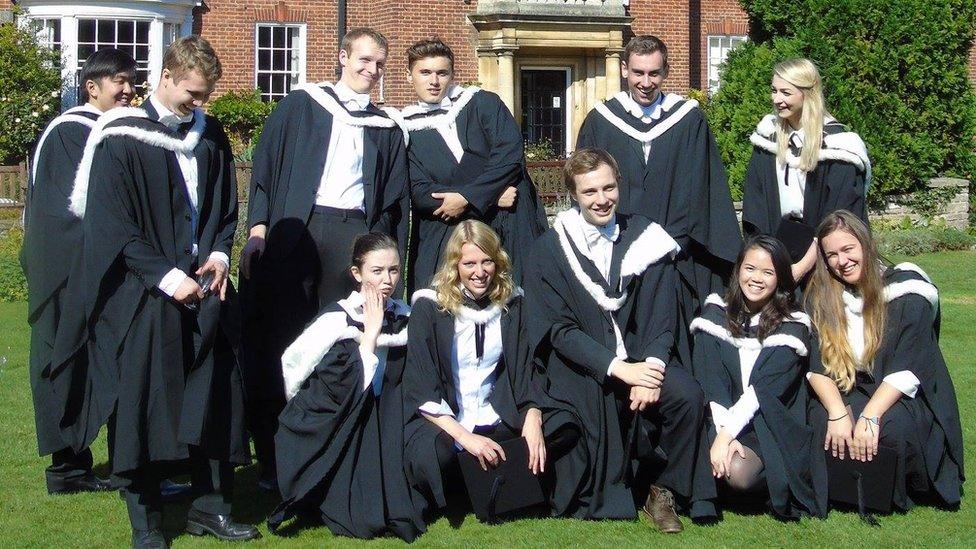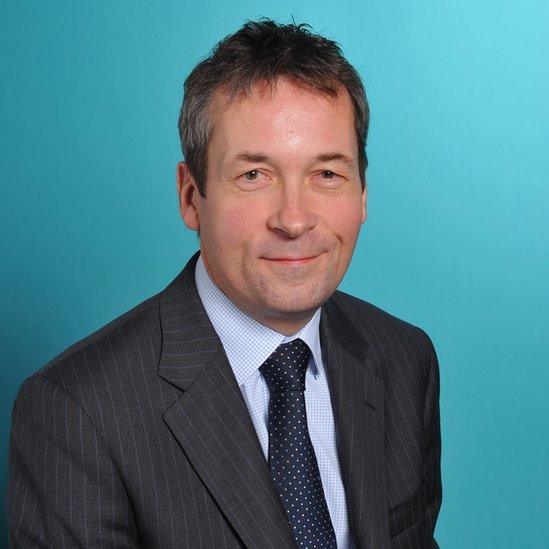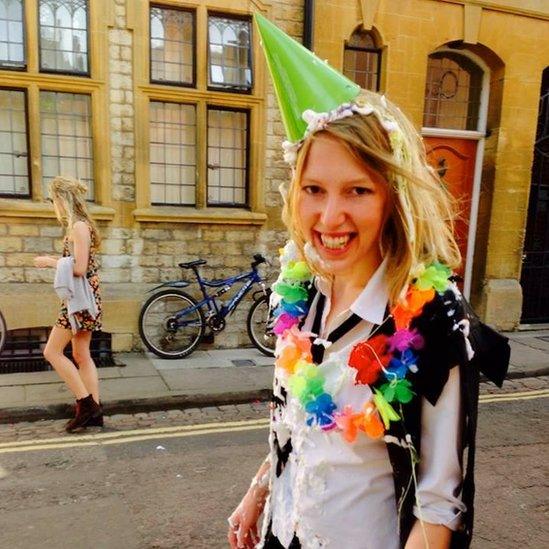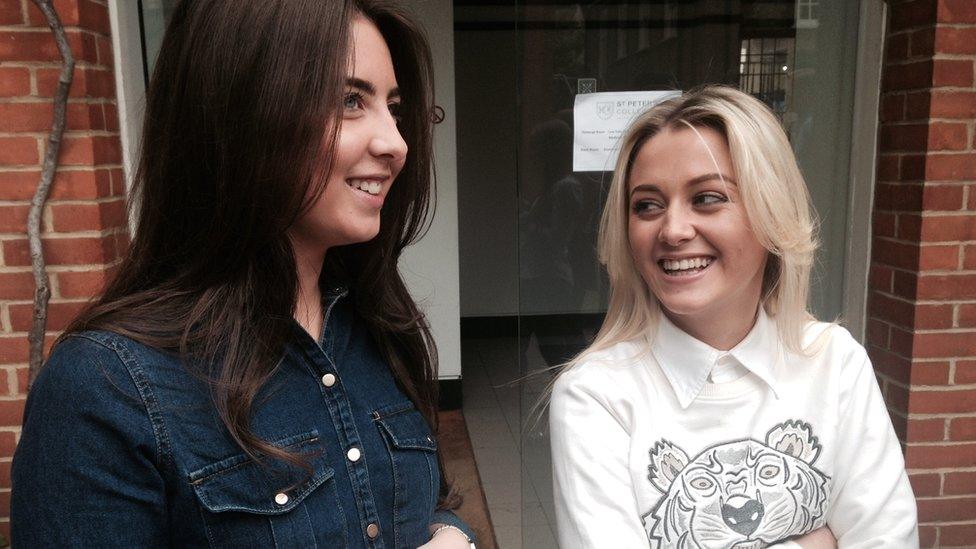Does an Oxbridge degree make a difference?
- Published

Freya Pryce (centre front) and some of the graduates of 2015
Oxford and Cambridge, academically elite, oversubscribed, criticised as socially exclusive - but do these degrees really live up to their reputation?
"I was worried that everyone would be really nerdy and posh," says Freya Pryce, describing her fears as she arrived at Oxford University in 2011.
Freya, who left with a first in human sciences last summer, says she was doubtful when teachers at her Aberystwyth comprehensive school first suggested she apply.
"I wasn't keen to start with. I had negative ideas about it. I thought it was elitist."
But an open day at the university was "a very positive experience", and the human sciences course, which combines a diverse array of subjects from genetics to sociology "was a big draw".
Once she started, she was aware of a social mix which still did not reflect the general population and shocked by the continued existence of "rich boys' clubs" where members are chosen based on wealth and social connections - but there were also "people from all sorts of backgrounds who were really friendly, open-minded and fun".
Workload
Sleep suffered in her first year as she struggled to juggle a heavy academic workload and a frenetic social life.
Now she believes her degree is helping her find work in her chosen field of international development and sustainability.
Freya's initial scepticism about Oxford is not uncommon among some state-school sixth-formers, according to a university spokeswoman, leading to great efforts to improve diversity.
"The idea that 'Oxford isn't the kind of place for me' is still something we need to address," said the spokeswoman.
This year almost 60% of Oxford's intake from state schools - the highest in 40 years.
At Cambridge the figure is 62% - up from just over half a decade ago.
"Before we uncork the champagne, remember 93% of pupils are in state schools," says Ian Bauckham, executive head of a non-selective Kent secondary that sends "a trickle" of students to Oxbridge each year.
Mr Bauckham was himself a state-school student who went to Cambridge and graduated with a first.
He admits finding it hard to start with. "I had never mixed with people who had the confidence and social advantage of many people there."
But once he graduated, he says having been to Cambridge helped him progress in his chosen career of teaching.

Head teacher Ian Bauckham says state school students can struggle with Oxbridge entrance interviews
Mr Bauckham says his school aims to identify students with Oxbridge potential early, mentioning it to them as soon as Year 10.
"It can open doors. These are highly regarded courses, often involving top researchers in their field," he tells them.
He says preparing his students, who often come from families with no history of university, let alone elite universities, can be "hard work".
"A lot of the selection is done largely on the basis of interviews which require confidence and poise to do well."
Challenges
He fears the process can be weighted against comprehensive students, with some admissions tutors subconsciously preferring students similar to themselves.
"Students will need to be able to debate, cope with cut and thrust and respond to unexpected challenges, such as to have done a greater depth and breadth of reading beyond A-level specifications.
"Pupils from elite public schools are imbibing this from friends and families from an early age."
Mr Bauckham says he has never met anyone who says they regret having gone to Oxford or Cambridge - but socially it can be hard.
"If you come from an ordinary family and a comprehensive school and then you meet people from Eton, Harrow, brimming over with confidence, as an 18-year-old you are on a steep learning curve.
"Some say, 'I would probably have had more fun at Sheffield University but now I have an Oxbridge degree.'"
This year has seen the highest number of applications to Oxford, with 19,500 applying for 3,500 places.
At Cambridge there have been 16,719 applications for about 3,400 places.
These figures just add to the aura of Oxbridge.
These are all top students competing for places, according to the Oxford spokeswoman: "Good grades get you to the starting line, but aren't enough on their own to guarantee a place.
"There is now a wider mix of backgrounds among applicants. Many people now know someone who is the best student they have ever known and they still don't get in."
The spokeswoman highlighted the tutorial system and academic rigour as a good preparation for any career, plus the chance to meet other bright and ambitious young people.

The end of finals was an excuse for a party
"It gives you a good preparation for any career in any sector," she added.
Since leaving, Freya has had an internship at a high-profile environmental organisation and is part of a team researching an Open University report on international wellbeing.
"I think going to Oxford was good for me," she says.
Academic skills and the university's reputation have been a real advantage when it comes to finding work she is interested in.
"You have to write up to three essays a week and discuss them in very small tutorial groups where the tutor guides you through the thinking process.
"The university's reputation for academic rigour is real... but you can gain these skills at other universities, so maybe it's about status as well."
- Published2 September 2016
